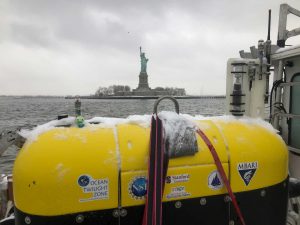Back to Sea in Bermuda
Mission Overview
For the first time since the start of the global pandemic, the OTZ team is returning to the field—but this time, it'll be on solid land. Since Covid-19 precautions have led to several cruise cancellations this year, the team is basing its operations at Station B, a new rapid development center for ocean technology that recently opened in Bermuda.
This shore-based work represents a new and innovative approach for twilight zone research in the Covid-19 era. Instead of working from a large vessel like the R/V Neil Armstrong, the OTZ team will take a number of day trips from Bermuda's coast. Just offshore, the ocean floor drops away dramatically, making it possible to reach deep water in a matter of hours. If successful, this arrangement may provide a rapid and flexible way to test oceanographic instruments in the field, letting the team fine-tune their tools to gather data more effectively on traditional cruises.
During day trips aboard the R/V Catapult, the team will extensively test Mesobot and new highly-sensitive radiometers. They'll also deploy the Twilight Zone Explorer (TZEx) an instrument that can record the movement of carbon-rich debris called "marine snow" as it sinks through the twilight zone.
Quick Facts
| Dates | February 20 - March 20, 2021 |
| Location | Bermuda |
| Ship | Catapult |
| Chief Scientist | Dana Yoerger |
| Science Objectives | Improve Mesobot's systems, including tracking and integration with new sensors, to gather more data about the ocean twilight zone on future cruises. Test Twilight Zone Explorer in open water. |
| Technology | Mesobot Radiometer TZEx |
| Partners | Station B |
Updates From the field
Field Notes: Bermuda Or Bust
The R/V Catapult passes the Statue of Liberty on its way to Elizabeth, New Jersey, with the snow-covered Mesobot stowed…
- « Previous
- 1
- …
- 3
- 4
- 5







